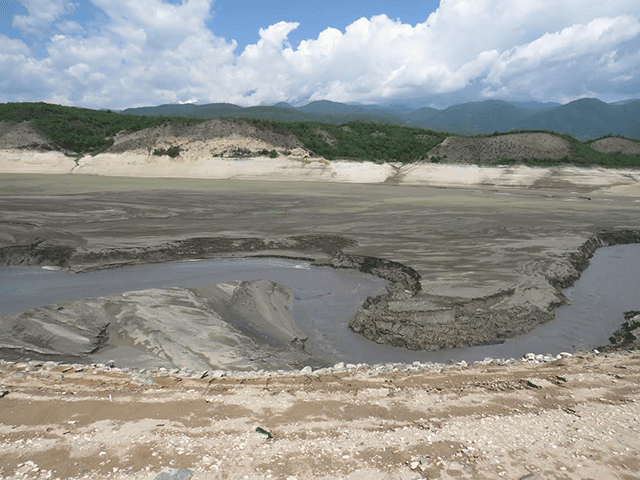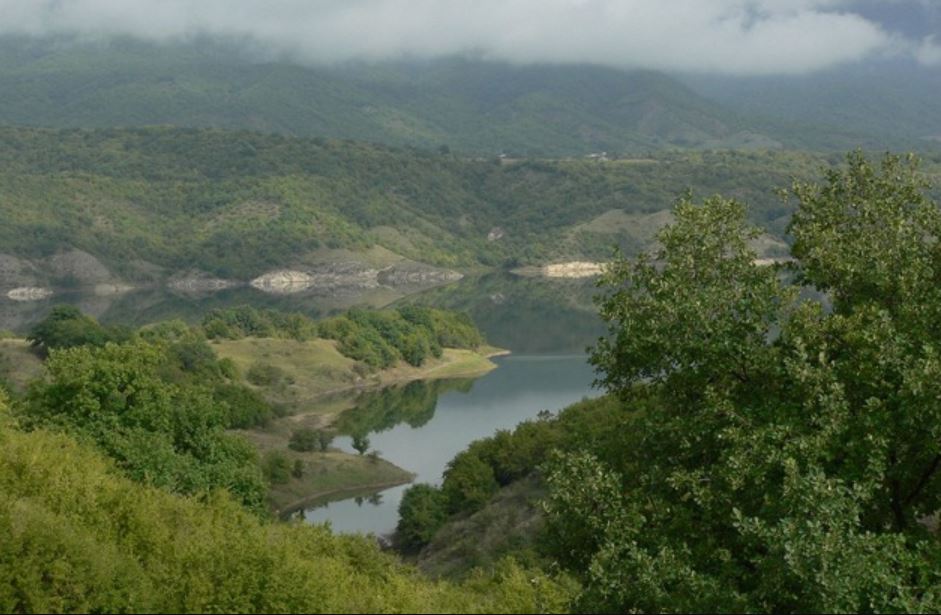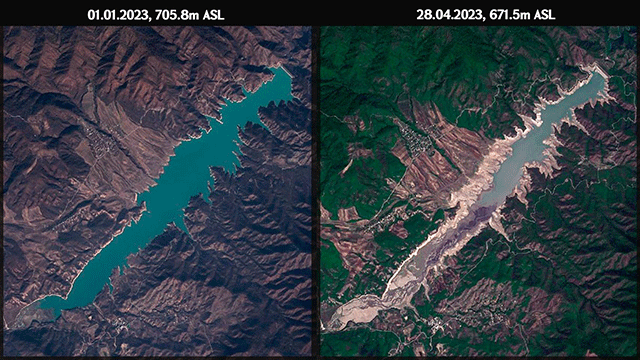In the conditions of the 158-day blockade of the Republic of Artsakh, since January 9, for 129 days Azerbaijan has been disrupting the electricity supply from Armenia to Artsakh through the only high-voltage power transmission line passing through the territory under its control.
By that way, Azerbaijan is carrying out energy, economic, humanitarian and environmental terrorism, causing suffering to the Artsakh people, as well as leading to a sharp change in the local microclimate, a decline in underground water resources, and the risk of losing numerous plant and animal species.
In these circumstances, the Republic of Artsakh is forced to rely solely on internal electricity production to meet the minimal energy needs of its people. Approximately 70 percent of this capacity is allocated to the Sarsang Reservoir hydroelectric plant.
Consequently, the Republic of Artsakh’s only major reservoir is currently facing severe environmental problems, impacting its biodiversity and overall environment. The reservoir’s surface area, evaporation rate, and infiltration have significantly decreased. These factors are the primary causes of the local microclimate change, which has numerous adverse consequences for the environment and agriculture.
Read also
The reservoir also plays a vital role in supplying groundwater and feeding natural springs in the Tartar River valley. The settlements and agricultural plots located below the reservoir’s water level are rapidly losing access to water resources. Springs below that level have experienced decreased outputs, some have dried up entirely, and the groundwater level has dropped.
Over-depletion of the water level in the Sarsang Reservoir has also led to maximum risks of loss of aquatic fauna and flora. A number of species, living on the banks of the reservoir and included in the lists of the Red Book of plants and animals of the Republic of Artsakh, are also endangered.
Such lowering of the reservoir level has led to serious risks of loss of edible and spicy (about 125 species), medicinal plants (about 35 species), honey-bearing (about 156 species) plants of the coastal area, and the mentioned plant species are an integral part of the environment and livelihood of the population of that area.
12 or 70.8% of the 17 species of fish found in the waters of Artsakh are located in the Sarsang reservoir, which is used by the residents of the coastal areas. Such reduction in water volume has sharply increased fish density and, as a consequence, both reduced foraging opportunities and increased risks of self-poisoning, which will lead to large-scale declines in the short term.
It is also home to the Southern banded newt, the Syrian spadefoot living in the coastal area, the Mediterranean turtle, and the Transcaucasian snake which are in “Critical Status” according to the criteria of the International Union for Conservation of Nature (IUCN) Red List. Among the main inhabitants of the Sarang Reservoir are the otter, among the mammals registered in the Red Lists of the IUCN, and among the birds, the little bittern and the great bittern, which lay their eggs in the dense coastal vegetation, and the drying of the reservoir has led to the extinction of the nesting colonies of these species. The Sarsang Reservoir area is a migration crossing point for a number of migratory birds, and such a sudden and unprecedented drop in water volume has also led to some loss of these bird species and changes in migration routes.
General information
The change in the level of the Sarsang reservoir is determined by the magnitudes of the components of the water balance, which in turn depends on the hydrological and weather-climatic conditions of the year, as well as the volumes of water released from the reservoir.
In addition to the prolonged failure of the Armenia-Artsakh electricity supply since January 9, both before and during the blockade of Artsakh, Azerbaijan periodically, and since March 22, had finally disrupted gas supply through the only Armenia-Artsakh pipeline. This has also led to the most serious humanitarian and economic problems, as well as to the inevitable increase in domestic consumption and production of electricity and overloading of power supply systems.
The HPP built on the Sarsang reservoir is working on an overloaded schedule, as a result of which, in the last few months, compared to the same period last year, almost three times more water was released from the reservoir, and the water inflow was almost twice less, because of the dryness of the current year’s climate, due to which the level has dropped by about 33 meters. As of the beginning of May, the water resources of Sarsang have reached the critical limit – about 88 million
cubic meters (about 15% of the total water capacity), approaching the dead (unusable) volume of about 70 million cubic meters. Although, as a result of the large-scale rainfall recorded in recent days, the reservoir reserves have been restored by several million cubic meters, but this is of a very temporary nature, and in a short period of time, due to the decrease in rainfall, the water level will start to decrease again.
If the electricity supply through the only high-voltage power line between Armenia and Artsakh is not restored in a short period of time, the water resources of the Sarsang reservoir will quickly run out, leading to the aggravation of the above-mentioned and other problems and a complete humanitarian and environmental disaster.
To get more information on the current situation of the reservoir it is recommended to watch the latest footage produced by the Artsakh Public TV.
The Environmental Committee of the Republic of Artsakh is monitoring the environmental situation of the Sarsang Reservoir, thanks to which it will be possible to more comprehensively assess the consequences of the ongoing environmental disaster.
Committee nature protection of the Republic of Artsakh





























































